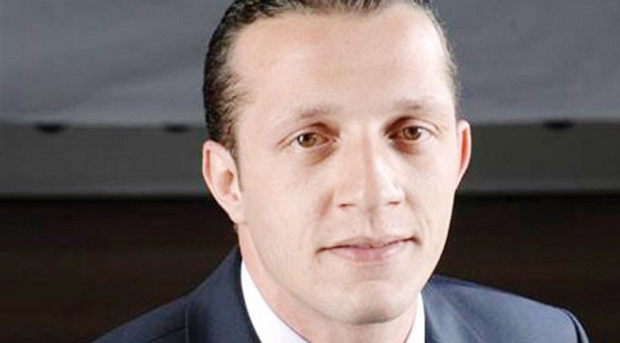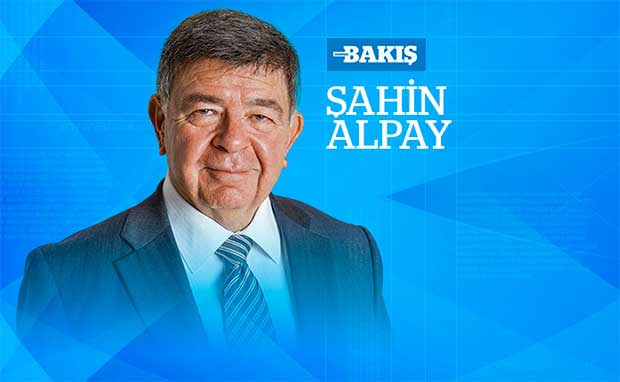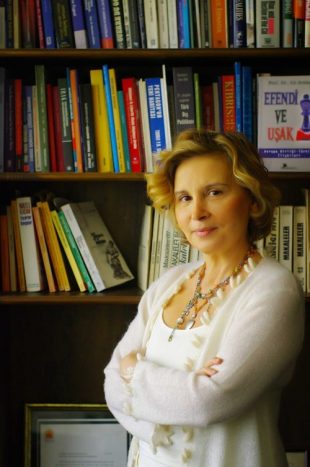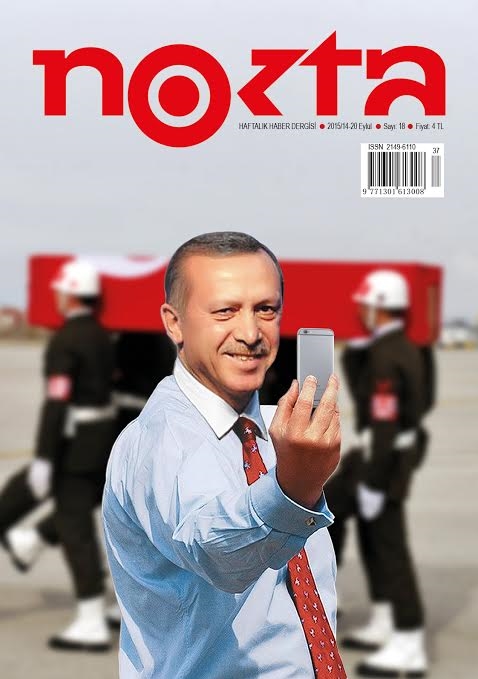29 Jul 2016 | mobile, News and features, Turkey, Turkey Uncensored

Arda Akin (Hürriyet)
The latest journalist arrested in Turkey is Arda Akın, a young reporter with the Hürriyet daily, part of the “mainstream” Doğan Media Group. Arda was in the “first” arrest list, issued on Monday, which mainly consisted of investigative reporters. In May, he was among those who won the European Union Investigative Journalism Award 2016, a prestigious prize delivered every year in six Balkan countries and Turkey. In his award-winning article, Akın told of corruption related to ruling Justice and Development Party figures.
Akın now joins 40 journalists taken into custody since the night of the bloody 15 July coup attempt. The arrests, in particular well-known veteran journalists such as Nazlı Ilıcak and Prof Şahin Alpay, adds to the profound concerns for press freedom in Turkey, where emergency rule gives the authorities power to extend arrest periods up to 30 days.
Former Swedish foreign minister Carl Bildt, who has known Alpay for many years, tweeted on Wednesday:
Meanwhile, a series of sanctions launched by the government ratchets up the worries to new levels. In an emergency decree, a large number of media outlets were shut down; their assets are to be expropriated by the government.
It’s a long list, encompassing 45 newspapers, 16 TV channels, 15 radio stations, three news agencies, 15 periodicals and 29 publishing houses. Some of these outlets were raided and allowed to continue under a trusteeship regime, but it seems apparent that they will be discontinued, with a large number of journalists joining the unemployed. In this context, we are witnessing the ruin of the Turkish media. Emergency rule means massive self-censorship within the existing conglomerate media with a block on critical reporting.
The mass closure targets those outlets allegedly affiliated with the Gülenists. But two questions arise immediately …
Why does the government not completely focus on the culprits who were part of the coup attempt and instead give priority to targeting journalists? We all know that, as long as it is not preaching violence or becoming part of it, journalism is not a crime. If there are journalists who are actively involved in plotting and execution of a coup — a very serious crime — they should, of course, be put on trial. Silencing a large bulk of the media simply places a frosted glass on this aspect, awakening fears that the other segments of the media — for example the Kurdish press — could be next.
Second, with less room for reporting and analysis, it will be more and more difficult to inform the public about the truth behind the coup attempt and the delicate situation Turkey is in. As expected, everything is now open to disinformation and the manipulation of facts.
In general terms, the decree curbing the media, as well as dismissing almost half of the top military brass, has very restrictive aspects. It is about the enhanced authority given to judges and prosecutors. It gives them powers to execute searches in houses and offices. The most serious part is that even defence lawyers’ offices will not be immune from raids and searches. For wiretapping, a ruling from the judge will not be necessary; it will all be up to the jurisdiction of the prosecutors.
With the decrees coming in, Turkey now enters an even more precarious period. Much will depend on whether or not the democratically elected opposition will act in unison, and manage to push for a return to normalisation. Tough times are ahead.

Turkey Uncensored is an Index on Censorship project to publish a series of articles from censored Turkish writers, artists and translators.
28 Jul 2016 | Europe and Central Asia, News and features, Turkey, Turkey Uncensored

Şahin Alpay is a columnist for multiple newspapers, including Yarina Bakis, which was forced to suspend its print edition after the coup.
It was 6am when Professor Şahin Alpay and his wife heard the knock at the door. It was the police. They had come to take him into custody.
The 72-year-old journalist’s flat was searched for two hours. As he was led away, Alpay said: “I do not know why I am being taken away. I am not in a position to say anything.”
Alpay was only one of 47 journalists who were subject to arrest under warrants issued on Wednesday. The list included the names of columnists, editors and reporters who formerly had been employed in Zaman daily, which was seized by the security forces last March. It and its journalists now stand accused of being the so-called media leg of Fethullah Gülen terror organisation.
Alpay has been one of the most consistent and powerful socially liberal voices in Turkey for decades. He is very well known in European political circles, particularly in Sweden where he had completed his doctorate. He is respected within Germany’s social democratic, liberal and green movements. For years, he had been part of democracy projects conducted by the Ebert and Naumann foundations. Until very recently he had taught political science at Bahçeşehir University and continued to write columns in multiple newspapers.
The list also includes names such as Hilmi Yavuz, an 80-year-old poet, philosopher and literary critic, who is also well known abroad. Other names on the list wereP rofessor İhsan Dağı, a brilliant liberal scholar, and theologue Ali Bulaç.
Then there are journalists: Lale Kemal, an outstanding analyst of defence issues for Jane’s Defence Weekly; Nuriye Akman, who is well known for her long interviews; Bülent Keneş, former editor-in-chief of Today’s Zaman, which is now controlled by trustees appointed by the government. The list goes on and on.
On Monday, a list of arrest warrants issued against 42 journalists. On Wednesday there were 47 more names. With this second wave of arrests, there seems no doubt that the clampdown on critical and independent journalism will continue in stages. The first wave targeted reporters regardless of the publications they were affiliated with. The second wave was aimed at Zaman. The message shared on social media: there is more to come.
Turkey’s situation cannot be any more serious. The aftermath of the completely unacceptable and bloody coup is marked by an incomprehensible priority to target dissenting intellectuals. This is reminiscent of the pattern the generals set down after the military coup in 1980. The targets were communists then, now it’s Gülenists that are the subject of the massive witch hunt.
The accusation directed at Nazlı Ilıcak, a 71-year-old veteran journalist on the centre right-liberal flank, is rather telling. The lawyers say that she is to be charged with “establishing the media leg of FETO terror organisation”, meaning a lifetime imprisonment if the charge sticks.
This was the overall picture as of the past 24 hours. It is, then, completely appropriate that, now that the witch hunt is openly targeting liberals on the right and left in Turkey, the rules of the emergency rule paves the way for a counter-putsch or, as the veteran journalist, Hasan Cemal, a close friend of Alpay and Ilıcak, labelled as “civilian coup”.
Indeed, Wednesday morning Human Rights Watch was swift in issuing an SOS warning to the world about the emergency rule, which now allows the authorities to keep people in custody up to 30 days.
“It is an unvarnished move for an arbitrary, mass, and permanent purge of the civil service, prosecutors, and judges, and to close down private institutions and associations without evidence, justification, or due process,” HRW said.
“The wording of the decree is vague and open-ended, permitting the firing of any public official conveniently alleged to be ‘in contact’ with members of ‘terrorist organizations’, but with no need for an investigation to offer any evidence in support of it,” Emma Sinclair-Webb said. “The decree can be used to target any opponent – perceived or real – beyond those in the Gülen movement.”
This is the list of 47 journalists targeted for arrest:
Osman Nuri Öztürk, Ali Akbulut, Bülent Keneş, Mehmet Kamış, Hüseyin Döğme, Süleyman Sargın, Veysel Ayhan, Şeref Yılmaz, Mehmet Akif Afşar, Ahmet Metin Sekizkardeş, Alaattin Güner, Faruk Kardıç, Metin Tamer Gökçeoğlu, Faruk Akkan, Mümtaz’er Türköne, Şahin Alpay, Sevgi Akarçeşme, Ali Ünal, Mustafa Ünal, Zeki Önal, Hilmi Yavuz, Ahmet Turan Alkan, Lalezar Sarıibrahimoğlu (Lale Kemal), Ali Bulaç, Bülent Korucu, İhsan Duran Dağı, Nuriye Ural (Akman), Hamit Çiçek, Adil Gülçek, Hamit Bilici, Şenol Kahraman, Melih Kılıç, Nevzat Güner, Mehmet Özdemir, Fevzi Yazıcı, Sedat Yetişkin, Oktay Vızvız, Abdullah Katırcıoğlu, Behçet Akyar, Murat Avcıoğlu, Yüksel Durgut, Zafer Özsoy, Cuma Kaya, Hakan Taşdelen, Osman Nuri Arslan, Ömer Karakaş.
A version of this article was originally posted to Suddeutsche Zeitung. It is published here with permission of the author.

Turkey Uncensored is an Index on Censorship project to publish a series of articles from censored Turkish writers, artists and translators.
25 Jul 2016 | mobile, News and features, Turkey, Turkey Uncensored

Nazlı Ilıcak
A “ping” woke me in early hours of Monday morning. It was a message from a colleague reading: “Signs of a crackdown. Arrest warrant for Nazlı Ilıcak is issued, she is being searched.”
This was the witch hunt that many critical journalists who belong to the shrinking independent media dreaded for days.
Ilıcak is a 72-year-old veteran journalist. A fiercely defiant figure who belongs to the centre-right and liberal flank of the media, she had just lost her column in the liberal daily, Özgür Düşünce, which was forced to close last week under immense legal and financial pressure.
I rushed out of bed to contact lawyers pursuing the cases, like the one about Orhan Kemal Cengiz, an internationally respected columnist, lawyer and human rights activist, who was conditionally released on Sunday with a ban on travelling abroad.
Soon we had been informed about a list of 42 journalists who have all been targeted with arrest orders on the basis of being part of the “media leg of terrorist organisation FETO” and by implication part of the Gülen Movement.
Reminiscent of Thomas Hobbes’s aphorism, “homo homini lupus” (“man is wolf to man”), some well-placed journalists were busy – like a certain popular columnist with Hürriyet daily – joining the chorus in support for their arrest.
The manhunt was unleashed early and at the time of writing, at least 19 of them were either seized or had surrendered. Ilıcak’s whereabouts were unknown. Eleven of the journalists on the list are believed to be abroad.
The list is a curious one. For us veteran journalists it contains a blend of good colleagues and bold reporters, who were busy breaking story after story on corruption, abuses of power and the deterioration of Turkey’s democratic order.
Büşra Erdal, who wrote for the now-closed Zaman Daily, was one of the best reporters covering the judiciary and court cases; Cihan Acar was known for relentlessly scrutinising stories in the now shuttered Bugün daily and later in Özgür Düşünce. They were long targeted as Gülen sympathisers but what mattered for journalism was their contribution to it.
Another, Bülent Mumay, was recently fired from Hürriyet. Staunchly secular, he ran the internet edition of the large daily, and it was his endless questioning of the government via Twitter that, he says, led to his unemployment. Perhaps not so surprisingly, he was quick to post a photo of his press card on Facebook, issued by Turkish Journalists’ Association (TGC), saying: “This is the only organisation I belong to. I know of no other; I know of no other profession. I shall now go the prosecutor’s office to tell this.”
Another one was Fatih Yağmur, a brilliant young reporter who was the first to break the story in March 2014 of the Turkish Secret Service lorries that allegedly carried weaponry to Syrian jihadists months before daily the Cumhuriyet, whose editor Can Dündar was sentenced to five years and ten months in prison.
Yağmur was soon after fired from Radikal daily, a part of Doğan Media Group, without any specific explanation.
The Platform for Independent Journalism (P24), of which I am a co-founder, has awarded Yağmur with the European Union Investigative Journalism Award last year. He was proud to be recognised after the humiliation of being left unemployed for doing his job properly.
Soon after the manhunt began, Fatih tweeted: “I hear that arrest order was issued on me. It was obviously not enough to punish me with unemployment. I am now shutting down my telephone etc. I shall not surrender until the Emergency Rule is over.”
We also found out that Ercan Gün, news editor of Rupert Murdoch-owned Fox TV, was on the list. His friends said he was on his way to Istanbul to surrender. Gün tweeted: “I trust the law, even if under Emergency Rule.”
With the traffic of those hunted, it was apparent that they believed a certain motive behind the arrests. Ufuk Şanlı, who had earlier worked with Zaman and after (the now a staunch pro-AKP daily) Sabah, tweeted: “I understand that the arrests were issued about journalists who covered and commented about the graft probes (about Erdoğan and the AKP top echelons) in 17-25 December. Thus, my name too.”
He added: “I’ve been a journalist for 15 years, and unemployed for 10 months. I want everybody to know that I have not been in anything but journalism all this time. I believe in democracy, and please pay attention to anything else [said].”
Indeed, the curious mix about the list is telling: instead of a core of columnists, keen reporters, which is the backbone of journalism, stand out. So, informing part of our profession is automatically dealt another severe blow.
This is now the time to raise the SOS flag to all our good colleagues in democratic countries. Unless given clearly articulated assurances about media freedom, the ongoing crackdown will remain a fact. The entire journalist community and international organisations should be acting with a maximum focus on the developments.
All the independent journalists of Turkey who fear the worst, I’m afraid, are justified to do so.
The 42 journalists targetted with arrest orders are: Abdullah Abdulkadiroğlu, Abdullah Kılıç, Ahmet Dönmez, Ali Akkuş, Arda Akın, Nazlı Ilıcak, Bayram Kaya, Bilal Şahin, Bülent Ceyhan, Bülent Mumay, Bünyamin Köseli, Cemal Azmi Kalyoncu, Cevheri Güven, Cihan Acar, Cuma Ulus, Emre Soncan, Ercan Gün, Erkan Akkuş, Ertuğrul Erbaş, Fatih Akalan, Fatih Yağmur, Habib Güler, Hanım Büşra Erdal, Haşim Söylemez, Hüseyin Aydın, İbrahim Balta, Kamil Maman, Kerim Gün, Levent Kenes, Mahmut Hazar, Mehmet Gündem, Metin Yıkar, Muhammet Fatih Uğur, Mustafa Erkan Acar, Mürsel Genç, Selahattin Sevi, Seyit Kılıç, Turan Görüryılmaz, Ufuk Şanlı, Ufuk Emin Köroğlu, Yakup Sağlam, Yakup Çetin.
But it was not just the press that have reason to fear the aftermath of the coup.
The number of arrests nationawide has approached 15,000 while 70,000 people have been purged within the state apparatus and academia. According to Erdogan’s statement late Saturday night, out of 125 generals arrested, 119 have been detained. The number of lower ranked officers and soldiers rounded up stands at 8,363.
Out of the 2,101 judges and prosecutors arrested, 1,559 are in detention as well as 1,485 police officers and 52 top local governors. Fifteen universities, 35 hospitals, 104 foundations, 1,125 NGOs and 19 trade unions have been shut down, based on the allegations that they all belong to a “parallel structure”, namely the Gülen Movement.
The largest union of judges and prosecutors, YARSAV, whose inclination is left and secular, has been shut down indefinitely. The country’s largest charity group, Kimse Yok Mu, which has a vast network of hospitals and orphanages across Africa and Asia, has also been closed.
All this official data speaks for itself, exposing the magnitude of the “counter wave”.
It raises huge questions for any decent journalist. We would be led to believe that Turkey’s arrested generals – a third of the country’s 347 – are Gülenists. But this doesn’t look at all convincing among political circles in the US capital, according to Hürriyet’s Washington correspondent Tolga Tanış.
What’s perhaps more worrisome is that given the coup attempt, the arrests and the incredible implosion, Turkey’s defence system is in huge crisis, leaving the country very vulnerable to hostile activity, in particular by IS units.
Then, of course, there is the widespread confusion over key institutions such as schools and hospitals being shut down. There is no clarity about the fate of the students and patients.
The emergency rule has sent chills deep into the intellectual and traditionally dissenting elite of Turkey. So far, there has been absolutely no assurance from Erdogan or prime minister Binali Yıldırım that the freedom and rights of those in the media, academia, civil society organisations and political opposition groups will be respected.
On the contrary, an arrest order was issued for 19 local journalists in Ankara. A young reporter with ETHA news agency, Ezgi Özer, was arrested in Dersim province. The rector of Dicle University in Diyarbakır, Ayşegül Jale Saraç was detained as well.
Not so surprisingly, then, there is a widespread mistrust and fear spreading now into the intellectual community in Turkey about what they see as an indiscriminate crackdown.
As my colleague Can Dündar put it in the Guardian on Friday: “‘Fine, we are rid of a military coup, but who is to shelter us from a police state? Fine, we sent the military back to their barracks, but how are we to save a politics lodged in the mosques?”
“And the question goes to a Europe preoccupied with its own troubles: will you turn a blind eye yet again and co-operate because ‘Erdogan holds the keys to the refugees’? Or will you be ashamed of the outcome of your support, and stand with modern Turkey?” Dündar added.
I agree with him and let me add a key point: if this oppressive trend continues with full force members of the media, academia, and civil society, as well as the young and secular who feel victimised and desperate due to the vicious cultural struggle that has been going on for years, will have no choice but emigrate. Europe and the West should brace themselves for this scenario.
Turkey is cracking under its incurable divisions.
A version of this article was originally posted to Suddeutsche Zeitung. It is published here with permission of the author.

Turkey Uncensored is an Index on Censorship project to publish a series of articles from censored Turkish writers, artists and translators.
23 Jul 2016 | Academic Freedom, Campaigns -- Featured, Europe and Central Asia, Mapping Media Freedom, mobile, News and features, Turkey, Turkey Uncensored
 It was at the early hours of Friday that a journalist sent a note to her colleagues.
It was at the early hours of Friday that a journalist sent a note to her colleagues.
“We are told by the management that our publication is discontinued with immediate effect,” she said. “We are told to pack our belongings and leave the office. You can’t imagine how sad I am.”
The weekly news magazine Nokta, which had been launched in the aftermath of a military coup in 1980s, is no more.
Lately, under a new management, Nokta belonged to the critical mass of what remained of independent journalism in Turkey, with long reads and popular, bright commentators such as Perihan Mağden and Gükhan Özgün.
My colleague went on to say that the management internal communique cited the loss of a printing house as the reason for the closure. Given the waves of restriction over basic freedoms in the wake of Emergency Rule declared in 81 provinces of Turkey, this explanation came as no surprise.
Commenting on the closure, a Kurdish colleague who has extensively covered the operations in Cizre and Diyarbakır, added: “It’s a disaster to have the media outlets shut down, but it’s even worse to see media professionals left without a job.”
In another incident, Paolo Brera, a well-known reporter with La Repubblica, was held by the police officers at Sultanahmet Square yesterday while interviewing tourists, and taken to police headquarters. At first his whereabouts were unknown, and Italy had to intervene at the highest level to have him released after four hours.
As of Friday afternoon the situation of the columnist and human rights lawyer Orhan Kemal Cengiz was unclear. Cengiz is an international figure and close friend of the Kurdish lawyer Tahir Elçi who was assassinated in Diyarbakır last summer. Among other assignments, Cengiz followed the case of Christian missionaries slain in Malatya in 2007. He attended the UN’s Human Rights Summit in Geneva some months ago, commemorating by explaining the situation to a larger audience. His colleagues are on standby, knowing that he is held at the Anti-Terror Unit in Istanbul. His wife, also a lawyer, had been told that the detention was related to a case from 2014, but nobody has any further details.
The Emergency Rule means that no lawyers other than those appointed by the bar associations are now allowed to have access to all the cases. What is also known is that those who are arrested are held in cells at police headquarters.
Justice Minister Bekir Bozdağ said in an interview yesterday that in “crimes related to terrorist activities” individuals can be detained for at least seven-to-eight days. “Our staff is working on the possibilities of even extending that time,” he said, adding that he shares the concern that it will be very difficult to distinguish innocents from criminals.
The overall situation continues to be opaque, with scarce information, and experienced journalists caution each other to compare what’s being officially stated with what’s really being done. The measures so far leave little doubt that the media and the academia are under severe pressure, and the growing concern is there is an escalation of a clampdown, without much explanation of what the media and academic freedom had to do with the very coup attempt itself.
A version of this article was originally posted to Suddeutsche Zeitung. It is published here with permission of the author.

Turkey Uncensored is an Index on Censorship project to publish a series of articles from censored Turkish writers, artists and translators.





 It was at the early hours of Friday that a journalist sent a note to her colleagues.
It was at the early hours of Friday that a journalist sent a note to her colleagues.